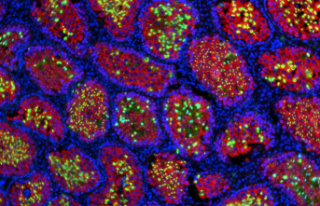On Sunday afternoon, Israel and the Palestinian Islamic Jihad (PIJ) agreed on a ceasefire from 8 p.m. By then, the PIJ had fired more than 700 rockets at Israel. Mainly in the south of the country, but also in the metropolitan areas of Tel Aviv and Jerusalem.
According to Israel, it flew airstrikes on more than 140 positions of the PIJ and specifically killed its two highest-ranking commanders in the Gaza Strip. Jerusalem reported several injured. The Palestinian side reported at least 31 dead, including women and children. She does not distinguish between militants and civilians.
The current escalation is a special case in the long line of wars between the Arab enclave and the Jewish state. Because the driving force in the Gaza Strip this time was not Hamas, which rules there, but the second largest terrorist group, the PIJ.
Like Hamas, the PIJ is an offshoot of the Egyptian Muslim Brotherhood. Both were founded in the 1980s. And both present the destruction of Israel as a prerequisite for the establishment of an Islamic Palestinian state. "Hamas and Palestinian Islamic Jihad are like big sister and little brother," says former Israeli military intelligence chief for Palestinian affairs, Michael Milshtein.
The "little brother" has fewer followers and weapons - but is even more radical than the older sister: "The PIJ is the most extreme outgrowth of political Islam in the Palestinian arena," according to Milshtein, who directs Palestinian studies at Tel Aviv University.
Among the most brutal terrorist attacks in the history of the PIJ are several suicide bombings in Israel. The first on the 405 bus from Tel Aviv to Jerusalem in 1989, killing 16 civilians. In the most recent wave of terror in Israel in the spring, in which more than 20 people died, several attacks were carried out on supporters of the PIJ in the West Bank.
Israeli security forces have therefore carried out several raids in Jenin, the stronghold of the PIJ in the Palestinian Authority, in recent weeks. When Israel announced earlier this week that it had arrested the commander of the PIJ in the West Bank, the terrorist group in the allied Gaza Strip apparently wanted to use this as an opportunity to carry out an assassination attempt that had been planned for a long time.
The PIJ wanted to attack civilian targets in Israel near the border fence with anti-tank missiles, said a spokesman for the Israel Defense Forces (IDF). The terrorist cell was therefore attacked in order to prevent the attack.
In the course of "Operation Dawn," which began on Friday, the IDF killed the two senior PIJ commanders in the Gaza Strip. The armed forces said they had attacked more than 140 targets of the terrorist group, including weapons depots, launch pads and tunnels. The PIJ threatened that it had only used "a small part" of its rockets.
While it does not have as many long-range missiles as Hamas, it does have a sizeable arsenal of small arms, mortars, rockets and anti-tank missiles. The PIJ is the terrorist group in the Gaza Strip with the closest ties to Iran. Although it is a Sunni movement, Shia Iran supports it with instructions on how to build weapons, money and trains the terrorists.
Significantly, when the current escalation erupted, PIJ leader Ziyad al-Nakhalah was visiting Tehran to meet President Ebrahim Raisi. The top echelons are not in the under-fire Gaza Strip themselves, but in Iran, Syria and Lebanon.
Experts estimate the strength of the PIJ in the Gaza Strip at between 1,000 and several thousand fighters. This contrasts with support from the population, which, according to expert Milshtein, is only between three and six percent.
Unlike Hamas, which wants to present itself as a political alternative to the secular Fatah party that rules the West Bank and claims leadership of all Palestinians, the PIJ has no political ambitions. Its raison d'être is the armed struggle against Israel, which is presented as "resisting the occupation".
The Federal Foreign Office has condemned the rocket attacks on Israeli towns and communities. Palestinian rocket attacks continue for third straight day. Israel specifically killed a leader of Islamic Jihad in Gaza on Friday.
Source: WORLD / Christoph Hipp
This very fact made it difficult for Israel and mediating Egypt to reach a truce - they had no leverage. Hamas, which as the ruling party also bears the political and social responsibility for the population in the Gaza Strip, can lure Israel with economic facilitation, with more – much sought-after – work permits for Palestinians from the Gaza Strip in Israel. The PIJ, on the other hand, does not feel responsible for the well-being of its own people and is therefore harder to persuade.
Terms of the ceasefire were not announced. At first there were fears that Hamas could get involved in the conflict. Then this could have lasted for several weeks. But the "big sister" apparently had no interest in it. It is still busy rebuilding its arsenal of weapons: last year it fired thousands of rockets at Israel.












